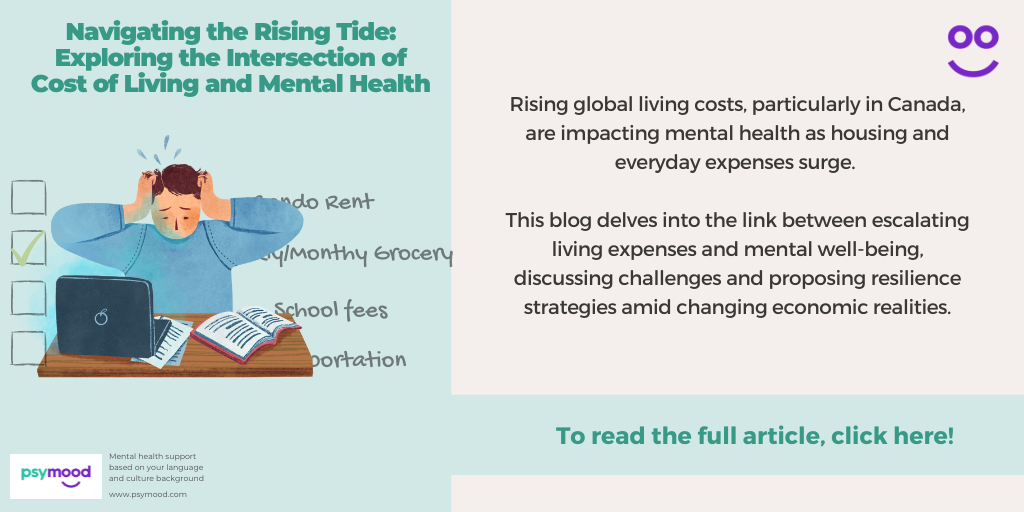Navigating the Rising Tide: Exploring the Intersection of Cost of Living and Mental Health
As the cost of living continues to skyrocket across the world, the economic landscape of Canada is undergoing its own transformation and it is taking a toll on people’s mental health. From housing prices that seem to ascend endlessly to the mounting expenses of everyday essentials, the financial strains on individuals and families have become an unavoidable reality. Beyond the realm of financial stress, the consequences of these escalating costs extend into the realm of mental health. In this blog, we will examine how the rise of the cost of living has intricately interwoven with the fabric of mental well-being. Join us as we explore the multifaceted impact, shed light on the challenges faced, and unveil potential strategies to foster resilience amidst these changing economic dynamics.
Knowing the Facts, Stressors in Canada
In Canada, like in many parts of the world, mental health is influenced by a combination of factors, making it complex to pinpoint a single leading cause. However, some of the key contributing factors to mental health challenges in Canada include:
- Income inequality
- Job Insecurities and stability, lack of jobs
- Inflation, cost of food and other necessities
- Education Inflation
- Cost of housing and rent
- Housing shortage
- Lack of access to mental health services
Cost of Living and The Impact on Mental Health
It is no secret that across the globe the cost of living has been rising at incredible rates. Everything from food prices to housing and renting costs, to buying everyday necessities has become almost unaffordable to most people. This has become a familiar reality to many Canadians, and not shockingly, many Canadians are developing mental health issues.
It seems like these days you can’t make it through the day without having to spend money. The high housing costs, increased healthcare expenses, and the rising prices of basic necessities have increased stress, anxiety, and even depression among individuals and families. We are seeing a rise in mental health in Canada like never before. “Recent research indicates Canadians’ mental health is worsening due to the rising cost of living. Canadians affected by inflation are experiencing: higher self-rated anxiety (33%) and depression (32%), higher rates of a recent diagnosis of a mood disorder since the pandemic (14%), and higher suicidal ideation (31%). Not only that, inflation is forcing people to cut back on health-related expenses”.
This is essentially affecting the younger generations such as Gen Z and Millennials. Unlike the previous generations, Gen Z and Millennials are finding it increasingly difficult to find jobs and housing. Many people are opting to get any job just so they can cover the ever-mounting cost of student loans, housing expenses, food, necessities, and luxury items like clothes and going out. Many young people live with the fact that they will never be able to own a house like their parents or afford luxury items like previous generations. They also realize that having a career is not the same as it was 20-30 years ago. In the past, you were able to work your way up through a company with limited education. Now you spend thousands of dollars on higher education and still not be able to get a job with a decent salary. And even if you find a job that pays well enough, the cost of housing and living is still so high that things like owning a house or apartment are still unattainable. It is no wonder that many Canadians are experiencing mental health problems like never before. It seems like we as a society are stuck in a deep rut that is impossible to climb out of.
What Needs to Change?
To address the impact of rising costs of living on mental health, several changes are needed:
Affordable Housing: Ensuring affordable housing options can alleviate financial stress and provide stability, positively impacting mental well-being.
Healthcare Accessibility: Improving access to affordable healthcare, including mental health services, can prevent financial strain and offer timely support.
Living Wages: Implementing policies that ensure fair wages can provide individuals with the means to cover their basic needs, reducing financial stress.
Education and Awareness: Increasing awareness about budgeting, financial management, and resources for financial assistance can empower individuals to navigate costs better.
Work-Life Balance: Encouraging work-life balance, flexible work arrangements, and support for caregiving responsibilities can alleviate stress caused by juggling responsibilities.
Support for Vulnerable Populations: Tailored support for marginalized and vulnerable populations, including low-income families and individuals, can mitigate the impact of rising costs.
Mental Health Services: Expanding access to affordable mental health services can provide individuals with the necessary tools to cope with financial stressors.
Social Safety Nets: Strengthening social safety nets, such as unemployment benefits and disability support, can provide a buffer during times of financial instability.
Community Programs: Investing in community programs that provide financial literacy education, employment assistance, and support networks can help individuals navigate challenges.
Policy Changes: Advocating for policy changes that address income inequality, taxation, and cost control measures can contribute to a more balanced cost of living.
By addressing the root causes of financial stress and taking a holistic approach, societies can help mitigate the impact of the rising cost of living on mental health and promote overall well-being.
PsyMood is a digital tool designed to help you find the support you need in the language that you are most comfortable with. PsyMood considers cultural background, geographical location, interests, and personal needs, amongst other factors, to pair you with service providers for either online or in-person therapy sessions.
For More Interesting Posts
You may also be interested in learning more about Inflation: Financial Issues and Effects on Mental Health – How to Build a Strong Community at Work, Seeking Refuge in the City: Understanding the Refugee Crisis in Toronto, Resources you can find as a Newcomer or Refugee to Canada, and Resources for Refugees, Migrants and Newcomers to Canada.


.png)
.png)
.png)
Recent Comments